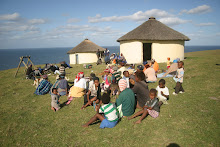Today we attended our first funeral in the village. Babalwas mother has died of TB last week. The funeral took place at their family compound. They had put up a big tent, and when Aidan and I arrived, the tent was packed with people, mostly women. Aidan got given a chair at the right side of the tent, where all the important men sat. In the middle was the coffin, and the table with the priests. To the left were all the church people, the women who belonged to the same church as Babalwas mother. They were all dressed in blue and white gowns and a funny white hat. The rest of the tent was filled with women sitting on the floor, shoulder by shoulder. The priest delivered one flaming speach after the other, gestikulating and shouting. The crowd sometimes cheered, sometimes laughed. I didn't see anyone cry. Between the sermons, the choir sang. Their voices still send shivers down my spine, so beautiful, so natural.
When the service was over, everybody got up and walked down into the field. Hundreds of feet brushing the long grass. Whispers of wind in waving skirts. The men all gathered around the grave and the women sat down a bit further away. Babalwa was sitting with the women, anonymous amongst them, still like a statue. The choir was just next to her. The priest at the grave delivered another thunderous speach, the choir sang, and then the men lowered the coffin into the grave and started filling the hole. Some young men grabbed the spades and started shoving the earth back into the grave. When one of them tired, another one came from the back and took over.
Soon the grave was filled. Now the women got up and walked past the grave, each of them throwing a handful of soil onto it. On their way back to the tent, they washed their hands in a big bucket.
After everyone had taken their seats again - the men on the row of chairs, the women
on the ground in the tent - the food was being served. The women formed a line and passed plates filled with food from hand to hand, down the line of men. While full plates of food went to the left, empty plates wandered to the right. After the food, tea and bread was served, and after that, Amarheu, a local drink made of mealie meal. Once all the men were served, it was the womens turn to get their food. Aidan and I always get special treatment, they reckon we don't know and understand their customs and so we are not obliged to follow the rules. It is impossible though to refuse food, no matter what you say, you HAVE to eat something.
Once the feeding was over, the crowd started scattering. Aidan and I left soon afterwards. Again I am amazed that I didn't see anyone cry. Somehow, death is more natural here than in the western, modern world, where everyone tries to cheat his way out of it. Here, people just die, and that's that, and life goes on.

